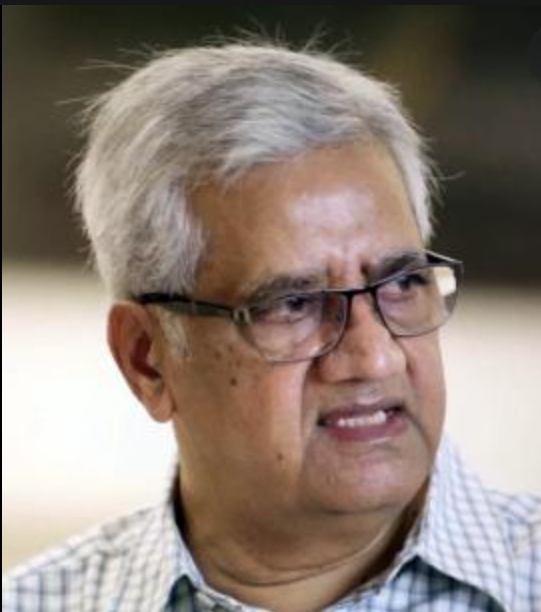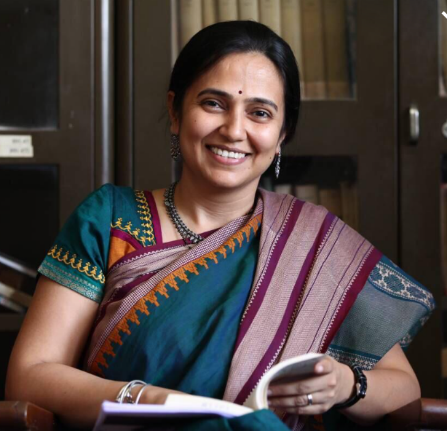Translated from the Gujarati by Pratishtha Pandya
A Poem for All Those Unwritten Ones
1.
Having realized that
it is not true that poems
not written down
do not exist
the poet is devastated.
He takes the ornaments off
his written words
and scatters them;
grinds the adjectives
into fine dust;
twists, breaks, and bursts the verbs.
They limp now.
And then he stands, helpless, in front of
wailing words,
in the unblinking stare of
those unwritten poems.
He realizes but cannot say for sure
where he stands,
not even if he writes incessantly,
not even if he doesn’t write a word.
Is he in the space of the written?
Or does he remain in the unwritten?
2.
Sometimes
a poet may hear
the sound of an unwritten poem
in the moonrise over the sea,
in the glorious waves of a high tide.
Sometimes
hiking in the mountains
without a guide,
staring at the emerald groves
of a forest,
in the sounds of the stones
rolling down around her,
a poet may read the letters of
an unwritten poem.
Sometimes
staring at the sky and wondering
who it is that hides
behind those clouds,
a poet may utter the words
of an unwritten poem.
And while she utters
She maps the cosmos
the whole of it
with the rhythm of his words.
3.
A poem when written down
stays with the sky, the sun, the earth,
with the water, the wind, the cold, the heat, the rains,
with the morning, the noon, the night,
in astronomy, in geography, in history,
with the beginning, with the middle,
with the eye, tongue, hands, ears, nose,
with language, grammar, rhythm, meter, rhyme,
pen, ink, paper,
stays with everyone.
A poem unwritten belongs
Only, only to the poet.
The poet doesn’t aim
to write the unwritten poem
but only to reach it by writing
more and more poems,
and to get lost in it
once she reaches there.
4.
The sheer weight
of a poem unwritten
makes a poet write
one poem after another.
An unyielding poem
submits to a poet
under the obligation
of an unwritten poem.
5.
An unwritten poem
hides the hopelessness of being.
A poem written down
shows the value of self-effacement.
A poet’s hands by the fingertips of a poem
keep hanging.
6.
A poet knows this
when she writes
that if she is not attentive
the poem will expose her
and yet the poet writes.
She keeps covering up for
for the poems not written.
Lies
1.
He used to lie at the drop of a hat
Ma used to twist his ears
Father used to give him nasty looks
Returning home from school
his cheeks bore marks of his master’s slaps.
He was taught the lessons in truth,
made to do experiments as well
but he was the darling of lies.
He decided his untruths
would make such a tiny fraction
of this vast earth!
And he was dead sure
that his eloquence quietly disguised
his umpteen untruths.
2.
Saw with my naked eyes,
listened to them with these very ears,
tasted, sucked, and licked each one of them.
I smelt and recognized them for what they were
in the depth of my chest.
I touched them,
again and again,
examined them closely
and then set them out for sale
these lies,
unfathomable by the senses.
3.
Jaws wide open,
tongues flapping,
eyes rolling,
spitting fire,
crossing swords against one another,
when lies chop heads
and destroy one another,
then from their bloody fountains
come spilling
more monstrous,
more heinous lies,
with wide open jaws,
tongues flapping
eyes rolling
spitting fire
crossing swords against one another.
Truth is on neither side
in this war of lies
and yet the wars are real,
without victory or defeat.
Lies against lies.
Eternal wars, real wars
fraught with lies.
4.
There is a hullaballoo
in the lexicon.
All because of this one word –
lies.
There have been riots
at some places
so many words have been
pulled out from their places,
roots and all,
only to be hurled around.
A few of them that escaped
are dancing with anticipation
waiting to be anointed as adjectives.
Some of the verbs
are melting, flowing away
just so that they can help lies
float away.
The surviving army of battered words
marches towards the subject
to immolate themselves
in the scorching flames.
5.
When a poem points out the lies
or challenges them
or prepares to defeat them
on the singular belief that
the word is the truth
that an emergency arises.
When the world lies intoxicated
under the spell of lies,
a poem has to stand by that belief,
risking its life,
at the cost of itself.
That is the value of poetry.
6.
Carrying a grain of truth
inside him
man assumes that somehow
he will be saved
and he befriends the lies.
Lies have an ego.
They assume that
when the time for war comes
their victory is certain.
But here is what happens:
both assumptions are proved wrong.
A Boy Who Chased the Waves
A boy who chased the waves of the sea
ran, and ran hard,
flung himself forward
and by the time he swirled
in the air and crashed
he was a wave.
Once he was a wave
he felt he wasn’t just one single wave
but he was the ocean itself.
Now he runs
long-distance races with friends,
falls flat on his face on the shore,
breaks, disintegrates,
and comes together like a roar
enveloping the rocks.
He empties his pockets full of
seashells
all over the sandy beach.
Sometimes reaching the far end,
diving into the bottomless sea
he finds and fetches
and sets afloat
a sun so scarlet red
and then returns to the
swaying coconut trees
on the shore
with a swagger
and an unbuttoned shirt.
Climbing the top of one of
the palm trees
he would boo and rest
and jump off,
scraping his knees.
Drenched,
he stumbles, and stands,
and gets dragged with his friends
in the depths of the sea,
where he sits
inside the wide-open jaws of
sea creatures,
rides the gills of the fish
and scull through the waters.
Leaping straight across
blazing oceans,
blinking his eyes
and roaming the palaces
of water nymphs,
his droopy face
stares at the sky for long.
Now satiated
after restless movements,
now getting up all of a sudden,
led by the fingers of the
blowing wind
he comes again to the shore.
And seeing some boy
chasing the waves
the sea gushes to encircle him
and slips that pearl in his palm
the one it had discovered
after much churning.
Lies
In reality, there are just three
types of lies: red, yellow, and blue
someone would say: three-headed
someone would say: three-tailed
some would even spot three eyes!
If red was about to get caught
Yellow would come forward
If yellow was to be captured
it would hide behind the blue
So no one could actually
say what the colors of the lies were.
Be as that might be,
but the ploy of the trio,
oh, Trahimam, Trahimam!
Triple torture ruled.
When they screamed
from the rooftops
the deep red streaks
flying in the air
made your cupped palms bloody.
The hands of those who would catch
had their faces turned scarlet,
a color of flames, of raging red fires.
But then the game would change
They would hover overhead
blinding the eyes.
Yellow, a solid yellow
would enter your body, your lungs,
and even the depths of your veins
and fill them up with intense irritation,
as if someone was peeling the skin
of a scorching desert
in the middle of a hot afternoon.
Yellow lies made one see
lies all around.
But then everything cools down.
Lies like a darkening eve
matured, cold-blooded,
snatch whatever little light
is left from the greying soot,
blowing about until now.
You may get confused and wonder
if all three of them
have switched off the lights
and gone to bed or what.
But that is the time when
weaving and entwining with
one another, shuffling
and reshuffling things,
eager to pounce
desperate
they jump
their giant leap mapping the distance between the earth and the sky.
JA-NEE-VA-LI-PI-NA-RA,
V-I-B-G-Y-O-R,
wows the viewers.
When people are lost in
the shouts of aafareen… aafareen…
JA-NEE-VA-LI-PI-NA-RA,
they play the final move.
Merging and melting with one another,
becoming one,
dissolving their differences,
craftily they hide their true selves
in white.
And then in a loud voice, they yell:
There are no lies. Nowhere.
Destroyed, annihilated,
thrown away
onto some other planet,
far away from this earth.
What are you saying?
Where could they be?
Come on, show us at least one.
When stunned folks are all ears
Then, exactly then
one after the other
in a continuous flow,
in their infinite, ever-changing forms
colorful lies multiply
into an eternal flow of lies,
from three to thirty-three,
then add a zero, and another zero
and one more, and…
89. from Vruddhashatak
The lesson that
life was tough
was something he had learned
early on.
But it took the
last moments of his life
when he was struggling to breathe
to make him realize
that to die was even harder.
He thought it would be as easy
as changing one’s clothes,
take the old pair off
and don a new one.
Never had he imagined,
not even in his wildest dreams, that
drumming right in front of him,
harassing, throwing obstacles in his way, incessantly,
sitting on his chest
breaking all boundaries,
hissing his way through his breath
creating a ruckus inside his hollow bones
death could tire him out
that dying would leave him breathless.
He used to plead.
sometimes even suspect:
if death loved
to torture rather than kill
and helpless as he was he would allow.
Though the hearing was gone,
since some time now, words–
God knows what is making this old man
hold on to life like this? Why doesn’t he die?–
would still accidentally fall on his ears
He would even understand those
and then on the verge of death
he had understood,
the hardest was
not being able to die.
Also Read:



























0 Comments